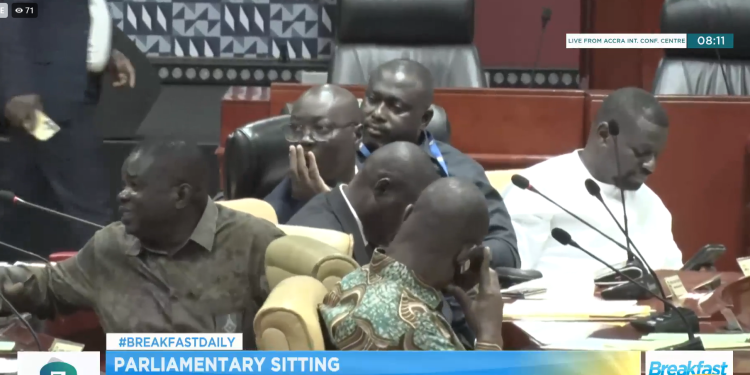The Minority Caucus in Ghana’s Parliament has taken over the seats typically reserved for the Majority, intensifying the already tense standoff between the two sides.
The move by the Minority, led by its leadership, comes as Parliament reconvenes for a highly anticipated session on Tuesday, October 22, 2024.
This bold action has heightened the political friction between the opposition National Democratic Congress (NDC) and the governing New Patriotic Party (NPP), as both sides vie for control of the Chamber amid a series of legal and political disputes.
The decision by the Minority to occupy the Majority’s seats is seen as a response to the recent ruling by Speaker of Parliament Alban Bagbin, who declared four parliamentary seats vacant on October 17, effectively reducing the NPP’s numbers and tilting the balance of power in favour of the NDC.
This ruling left the NDC with 136 seats, making them the de facto majority in the Chamber, while the NPP retained 135 seats. The vacant seats include two from the NPP, one from the NDC, and one held by an independent MP.
However, the Majority quickly challenged the Speaker’s ruling, with Majority Leader Alexander Afenyo-Markin filing an appeal with the Supreme Court. On October 18, the Court intervened, staying the Speaker’s ruling and ordering that the affected MPs be allowed to continue their duties until a final decision is reached.
This has left the status of the Majority in Parliament in limbo, and the situation has escalated into a power struggle over control of the Chamber.
The Minority’s decision to occupy the Majority side is widely viewed as a symbolic assertion of their newfound numerical advantage. Minority Chief Whip Governs Kwame Agbodza, in an interview prior to the session, stated that their actions were justified based on the Speaker’s ruling and the current composition of Parliament.
As the session began, MPs from the NDC were seen filing into the seats traditionally reserved for the NPP, with some members of the Minority leadership seated in the front rows alongside the Majority Chief Whip, Frank Annoh-Dompreh.
This caused an uproar among the NPP MPs, who protested the move and accused the opposition of attempting to usurp their position without regard for the ongoing legal process.
The Majority Caucus, led by Frank Annoh-Dompreh, expressed strong disapproval of the Minority’s actions. Annoh-Dompreh, who had earlier dismissed accusations of being “smuggled” into Parliament, warned that the Majority would not stand idly by while the Minority tried to assert control.
Security in and around Parliament has been visibly heightened in anticipation of clashes between the two sides. Both MPs and parliamentary staff were subjected to thorough screening before entering the Chamber, and bodyguards were not permitted inside.
Additionally, access to the public gallery was restricted, and parking around the Grand Arena was tightly controlled to prevent congestion.
The political stalemate in Parliament comes at a critical time for Ghana, as the country gears up for the 2024 general elections.
The legal and constitutional implications of the Speaker’s ruling, the Supreme Court’s intervention, and the ongoing tussle over parliamentary seats have created a volatile atmosphere, with both the NPP and NDC determined to emerge victorious.
The Ghana Center for Democratic Development (CDD-Ghana) has urged both sides to exercise restraint and follow the due process of law to resolve the current impasse. In a statement, the Center warned of the potential for political instability and called for all stakeholders to prioritize the nation’s peace and stability.
As the legal battle over the vacant seats continues, the political drama in Parliament is expected to intensify in the coming days, with both sides digging in for what promises to be a prolonged confrontation.
Whether the Supreme Court’s final decision will restore order or further deepen the divide remains to be seen, but for now, the Minority’s bold move to occupy the Majority side has sent a clear message that the battle for control in Parliament is far from over.


